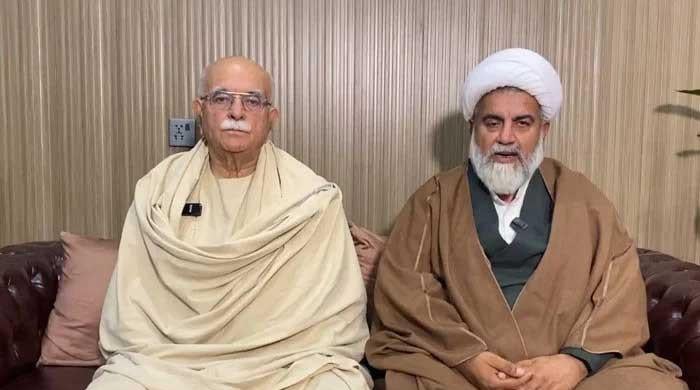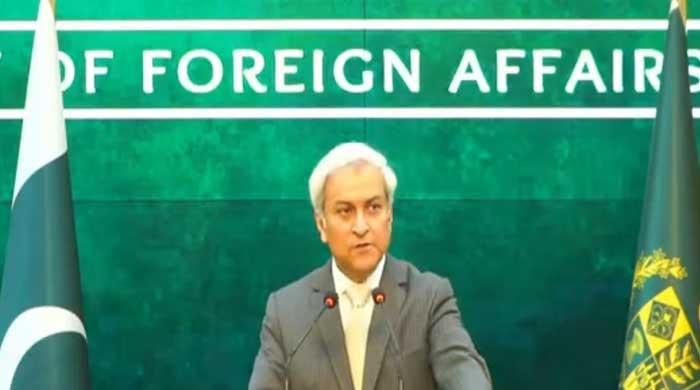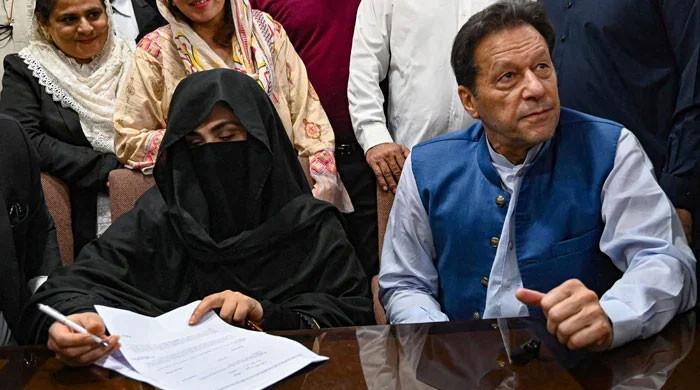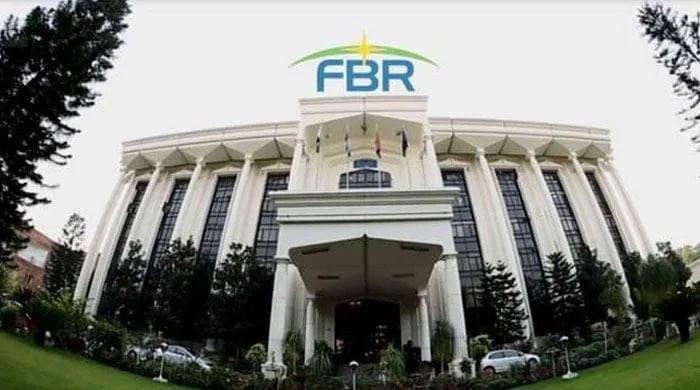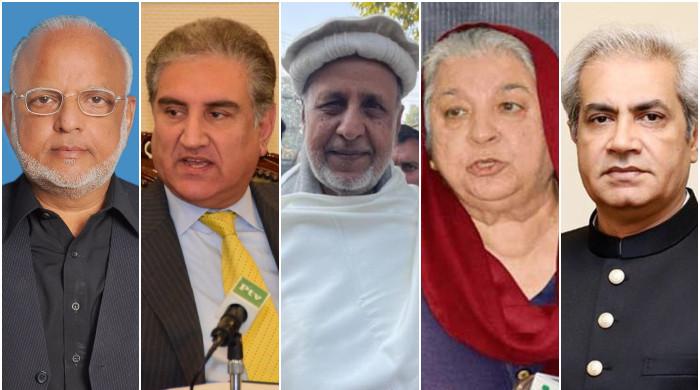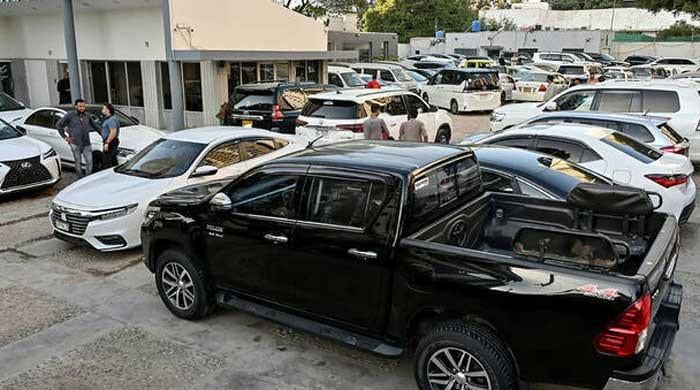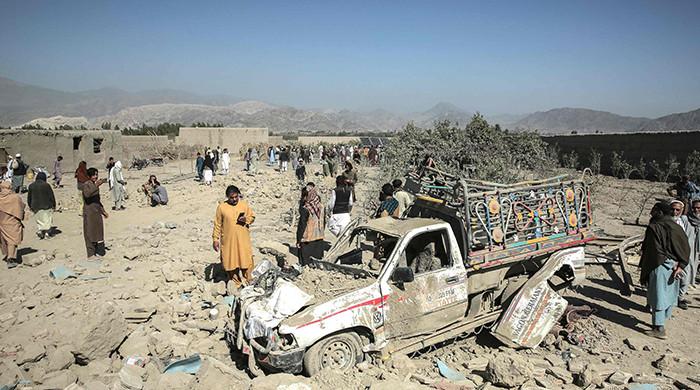PM Imran Khan touches down in Islamabad after concluding 'successful' China visit
During PM's visit, China reaffirms support for Pakistan in safeguarding its sovereignty, independence, and security
February 06, 2022
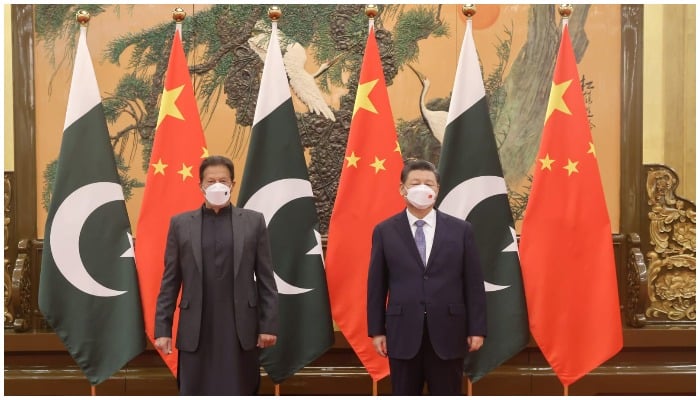
- PM Imran Khan arrives in Pakistan after four-day China visit.
- Prime minister meets Chinese premier, president in Beijing.
- China reaffirms support for Pakistan in safeguarding sovereignty.
- FM Shah Mahmood Qureshi meets counterpart, Wang Yi.
ISLAMABAD: Prime Minister Imran Khan and his high-level delegation arrived in Pakistan on Sunday after concluding their four-day visit, with the Minister for Information and Broadcasting Fawad Chaudhry terming it "successful."
The prime minister’s four-day visit included meetings with top Chinese leadership, the business community, the signing of several memoranda of understandings (MoUs), and attending the opening ceremony of the Winter Olympics — as a sign of solidarity with Beijing.
Before leaving for Pakistan, PM Imran Khan met President Xi Jinping at the Great Hall of People in Beijing — the first meeting of the two leaders since the prime minister's visit to China in October 2019.
The two leaders reviewed the entire gamut of Pakistan-China bilateral cooperation, while also exchanging views on regional and global issues of mutual interest, a PM Office statement said.
Read more: PM Imran Khan meets Chinese premier, Uzbek president in Beijing
The prime minister briefed President Xi on a people-centred geo-economics vision and his government’s policies for Pakistan’s sustained growth, industrial development, agricultural modernisation, and regional connectivity.
CPEC
He lauded China’s continued support and assistance to Pakistan’s socio-economic development which had greatly benefitted from the high-quality development of the China-Pakistan Economic Corridor (CPEC).
The prime minister welcomed increased Chinese investments in CPEC’s Phase-II which centred on “industrialisation and improving people’s livelihoods”.
Risks to developing countries
PM Imran Khan shared his views with President Xi on growing polarisation in the world which threatened to unravel global developmental gains and posed serious risks to the developing countries.
He highlighted that insurmountable challenges like climate change, health pandemics and growing inequalities could only be tackled through unqualified cooperation of all nations in accordance with the purposes and principles of the UN Charter.
In this regard, he lauded President Xi’s visionary Belt and Road and Global Development Initiatives which called for collective action for sustainable development and win-win outcomes.
Highlighting Kashmir issue
The prime minister highlighted that atrocities being perpetrated in the Indian Occupied Jammu and Kashmir (IOJK), and the persecution of minorities in India in advancing the Hindutva mindset of RSS-BJP was a threat to regional peace and stability.
“Rapid militarisation of India was undermining regional stability,” PM Imran Khan said.
PM Imran Khan highlighted that partnership between Pakistan and China was an anchor for peace and stability in the region and thanked China for its unwavering support to Pakistan’s sovereignty, territorial integrity, independence and national development.
The prime minister also reaffirmed Pakistan’s full support to China on all issues of its core interest.
Both leaders acknowledged that a peaceful and stable Afghanistan would promote economic development and connectivity in the region and called on the international community to promptly assist the Afghan people in averting a humanitarian catastrophe, the statement said.
The handout added that both leaders appreciated the signing of a number of agreements covering industrial cooperation, space cooperation, and vaccine cooperation.
Read more: Putin arrives in Beijing for Winter Olympics with gas supply deal for China
The two leaders reaffirmed their resolve to build the Pakistan-China community for a shared future in the new era, it said,
The prime minister renewed his invitation to President Xi Jinping to undertake a visit to Pakistan at his early convenience, the statement added.
FM Qureshi meets counterpart
Meanwhile, Foreign Minister Shah Mahmood Qureshi earlier held a meeting with State Councilor and Foreign Minister Wang Yi in Beijing.
The foreign minister was in the delegation accompanying the Prime Minister on a visit to China to attend the 24th Olympic Winter Games.
Recalling their last meeting in Chengdu for the 3rd round of Pakistan-China Strategic Dialogue, the foreign minister appreciated the measures taken by the two sides to strengthen the All-Weather Strategic Cooperative Partnership between Pakistan and China.
He thanked his counterpart for China’s firm support to Pakistan’s sovereignty, territorial integrity, independence and national development, and reaffirmed Pakistan’s full support to China on all issues of its core interest.
FM Qureshi underlined that the prime minister’s face-to-face meetings with the Chinese leadership would provide fresh momentum to the bilateral strategic cooperative partnership, add new avenues to practical cooperation, spur high-quality development of CPEC including industrial development, and develop greater synergies between the visions of geo-economics and Global Development Initiative.
Regional situation
The two foreign ministers also discussed the evolving situation in the region and beyond, in particular the grave humanitarian situation in Afghanistan.
Foreign Minister Qureshi briefed State Councilor Wang on the gross human rights violations in Indian occupied Jammu and Kashmir and systemic assaults on the freedoms of minorities in India.
On the issue of Afghanistan, both sides appreciated the important role played by the meeting of the six neighbouring countries in evolving regional consensus and looked forwarded to its third meeting to be held in China.
It was agreed to maintain closer coordination to promote the shared objectives of peace, stability and development in Afghanistan and regional connectivity.




